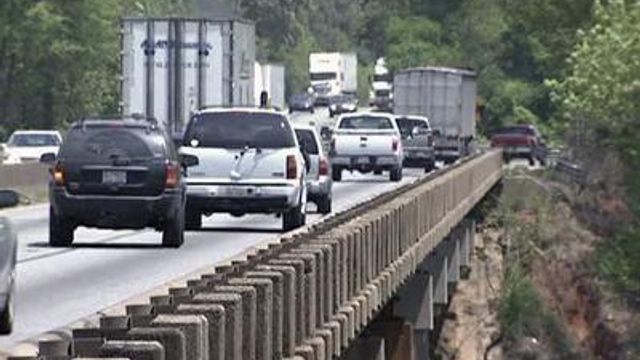Dodd sees hope from infrastructure spending
Current and former politicians on Monday touted investment in infrastructure as a means to build both jobs and optimism in North Carolina. The speakers addressed the annual Emerging Issues Forum at N.C. State.
Posted — Updated"We can do big and bold things that can last a long time," said former Gov. Jim Hunt, who created the annual Emerging Issues Forum nearly a quarter-century ago.
The two-day forum hosted by North Carolina State University brings together public policy leaders to discuss looming challenges. This year's focus on infrastructure deficiencies came just as Congress and the Obama administration grapple with a federal stimulus package that includes spending to repair highways and bridges, expand railroad and mass transit routes, and update public water systems.
But while President Obama has urged quick spending on public projects to put people to work, less than 8 percent of the Senate's $827 billion package is directed at infrastructure projects. About 11 percent of the House's $820 billion version is for public construction needs.
That boosts the $1.1 trillion in annual U.S. infrastructure spending, but it's a fraction of the estimated $2.2 trillion in needs over the next five years, according to a report last month by the American Society of Civil Engineers.
A quarter of the country's bridges are deficient; in North Carolina a third of the spans aren't up to the demands of their use, ASCE president Wayne Klotz said. Seven billion gallons of clean drinking water just leaks away because water systems in some cities are a century old, he said. The country's average grade was D in 15 areas including aviation, dams and bridges evaluated by the society, Klotz said.
"Our infrastructure system's parts are not serving their intended purposes," Klotz said, and are not adequate for a growing economy.
The risks of failing to maintain public works were captured most dramatically when levees protecting New Orleans failed from insufficient maintenance and investment, flooding the city during Hurricane Katrina, Klotz said.
But the need for improved public works is being recognized at the same time the U.S. economy needs a jolt that business investment or consumer spending seem unable to provide, said U.S. Sen. Christopher Dodd, D-Conn.
"To do things differently, you need to begin thinking differently," Dodd said, calling the infrastructure spending in the federal stimulus package "downpayments on the long-term needs of our nation."
Infrastructure construction has fueled nearly every successful society in history, Dodd said, from the Roman water-delivery networks still in use today, to the highways the Incas built across South America's Andes mountains, to the Erie Canal that opened trade from the Great Lakes frontier to East Coast ports in 1825. Today, China is building super-modern airports and mag-lev trains to climb into the ranks of leading economies.
But America's big challenge creates opportunities, like an idea for a high-speed, coast-to-coast freight railroad between Long Beach, Calif., and Wilmington that could compete with the Panama Canal as a faster way to move goods from Asia to Europe, Dodd said.
Rural electrification, massive dams and other public projects built during the Depression continue to deliver benefits today, Dodd said. But those efforts also restored confidence "that Americans can push back against any odds," a benefit that would come from new infrastructure projects, Dodd said.
Copyright 2024 by WRAL.com and the Associated Press. All rights reserved. This material may not be published, broadcast, rewritten or redistributed.





